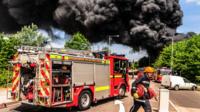

Emergency network plans questioned
-
10 June 2015
- From the section Technology

Mobile phone company O2 has withdrawn from a process to select the next operator for the UK’s emergency services network.
It is unable to provide the “commitments required to continue into the next stage” because of its proposed acquisition by Hutchison, it says.
The government wants the network to be run by a commercial operator, but only EE is currently left in the bidding.
Experts have accused the government of rushing the radical shake-up.
In a statement O2 blamed uncertainty in the mobile market.
“The potential restructuring of the UK telecoms market as a result of current mergers-and-acquisitions activity affecting several players in the industry raises questions about spectrum (both current holdings and timings of access to future spectrum), network-sharing arrangements, and, specifically in our position, the proposed potential acquisition of O2 in the UK by Hutchison Whampoa,” the company said..
“We are therefore unable at this time to provide the detail and commitments required to continue into the next stage of the bidding process put forward by government.”
Mike Penning, Minister for Policing, Crime, Criminal Justice and Victims, said that the decision to withdraw from the bidding was “disappointing”.
“However, the process to establish a more effective, flexible and affordable network for the UK’s police, fire and ambulance services will continue,” he said.
“Procurement remains extremely competitive and will deliver value for money to the taxpayer irrespective of O2 Telefonica’s decision to withdraw.
“Seven other bidders remain in the running for the main contracts, and we look forward to receiving their best and final offers in June.
“We hope to sign contracts later this year.”
These seven bidders – which include HP, Motorola and Lockheed Martin – are competing for contracts to support the implementation of the mobile network. But the contract to run the network itself now has just one bidder, EE
Mission critical

The new Emergency Services Network is expected to go live in 2017 and will provide mobile, voice and data communication to police, fire and ambulance services, among others.
The government wants to see it move from its current dedicated network to a commercial 4G one, which it believes will offer greater flexibility as well as cost savings.
The company that currently runs the network – Airwave – was not shortlisted for the latest stage of bidding.
Chief operating officer John Lewis told the BBC: “Our view is that 4G is the right technology but that currently it is not ready for mission-critical voice services.
“The standards are not yet ready, and this is a pretty commonly held view in the industry.
“We don’t feel that the mobile networks will be ready to take on the very crucial role that emergency services play until at least 2020.
Currently, the networks don’t have the coverage or the resilience to deal with the specific demands of our customer base.”
He added that one customer – the UK’s fire and rescue service – had decided to extend its contract with Airwave until 2020.
The police and ambulance service could also decide to renew contracts until the same date, he added.

